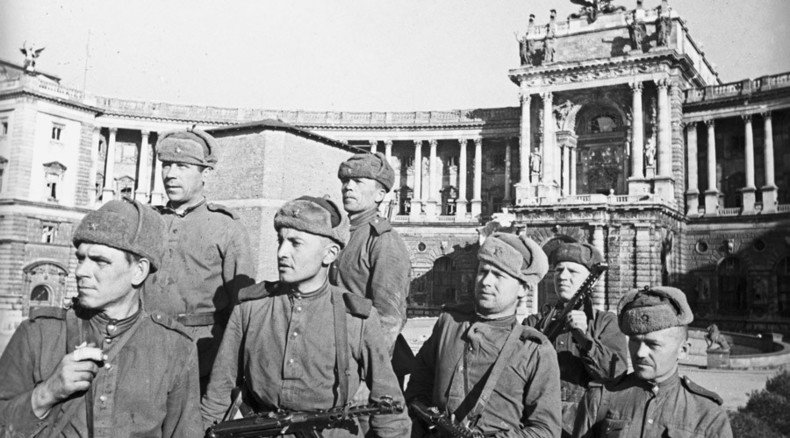Austrian family unveils inspiring monument to fallen Soviet WWII soldiers

Brothers Johannes and Markus Riegler have designed and paid for a monument honoring fallen WWII Soviet soldiers and a French war prisoner in their hometown, Thomasberg in Lower Austria.
Семья в Австрии установила памятник погибшим советским солдатам http://t.co/RJLJX8jLnQpic.twitter.com/gvh8Ztyqpi
— РИА Новости (@rianru) October 10, 2015The idea belonged to younger brother Markus Ziegler, an engineer, who designed the monument and took part in the building process.
His older brother Johannes, born in 1938, spent his whole life in Thomasberg, a small town in Lower Austria.
During the Second World War his family hid four escaped prisoners of war: three Frenchmen – Gustave, Ferdinand and Henri Cottele – and a woman from Ukraine called Olga.
On March 29, 1945, nearby Wiener Neustadt was bombed by the Soviets fighting the Nazi regime in Austria and one of the war planes got hit on its way back from the mission, leaking petrol onto neighbouring houses and trees, causing fires to break out.
President orders Moscow monument to victims of political repressions http://t.co/xTdXJNk5i5pic.twitter.com/2YoxcMoqvz
— RT (@RT_com) October 3, 2015The plane crashed so close to Johannes’s house that its debris killed one of the Frenchmen, Henri Cottele.
The morning after the crash, locals saw that the plane was a North American B-25 Mitchell, used by the Soviets at the time. The pilot and passengers died in a fire inside the bomber and were buried near the site. The pilot was identified as Guard Lieutenant Nikolay Pronnikov, and his passengers as Guard Squadron Commander Lieutenant Anatoliy Tinyakov and Guard Lieutenant Navigator Pyotr Krasnikov. The other passengers could not be identified.
The Rigler family have held on to the crashed bomber’s propeller until now, and it has become part of the monument, which also a plaque with the names of the deceased and a description of the events.
Johannes Rigler says that he was too young to remember much of the war, but he recalls one episode when Soviet soldiers had stolen some eggs from them that his grandmother had hidden. Otherwise they never took anything else from the Austrian family.
The opening of the memorial was attended by local officials, diplomats and military officials in uniform from both the Russian and French embassies and proud family members.
But coming to terms with the role of the Soviet Union in World War II is still an issue in many parts of Europe.
Monument to Ivan Chernyakhovsky, youngest Soviet general of the army & twice Hero of Soviet Union removed in Poland pic.twitter.com/fcTndS2sG9
— Andrey (@AndreyPanevin) September 20, 2015Last month, Russia summoned the Polish Ambassador to Moscow to protest the removal of a statue to General Chernyakhovsky in the Polish town of Pieniezno.
READ MORE: Moscow summons Polish Ambassador over dismantled Soviet-era monument
Chernyakhovsky was the youngest ever general in the Red Army and one of the leaders of the Soviet campaign against Nazi Germany in Poland.
Soviet Victory Monument in Riga, Latvia. Cos when Soviets build a victory monument you know someone's been schooled. pic.twitter.com/zoDlTwU6dt
— Phil Dore (@thus_spake_z) February 23, 2015Another recent scandal involved a Polish arts student who was so affected by what he had read about war atrocities that he decided to depict his recently-found knowledge in a gruesome display of a Soviet soldier raping a pregnant woman while pushing a gun down her throat. The statue was displayed on Gdansk’s Avenue of Victory until it was removed by authorities while the artist, Jeremy Szumczyk, was arrested.
READ MORE: Latvian party calls for demolition of Soviet Liberator Memorials
In 2007, the relocation of the Bronze Soldier, a Monument to the Liberators of Tallinn, in Estonia resulted in two days of riots, which were the biggest in the country’s history.
In 2013 Latvia’s National Alliance party tried to win votes in Riga’s mayoral elections by proposing to demolish the Memorial to Soviet Liberators and turn its location, Victory Park, into an amusement park.
READ MORE: Russian-Polish tension: Anger at bitter truths
The BBC published an article titled “The Rape of Berlin,” just days before Russia was to mark the 70th anniversary of the Soviet Union’s victory over Nazi Germany – a war in which total Soviet losses were estimated at 27 million lives. The article draws upon unreliable sources describing horrific actions of Soviet soldiers when they took Nazi Berlin. It opens with the description of the Soviet War Memorial in Treptower Park, Berlin. “But some call this memorial the Tomb of the Unknown Rapist,” Lucy Ash, the article’s author, writes.
In response to the piece, writer Sam Gerrans wrote: “Looking beyond the framework of this individual article, it is difficult given where ultimate editorial responsibility lies not to see a broader and subtle conflict, one in which former allies feel the need to reframe the past in order to support present and future concerns.”
READ MORE: BBC reframes WWII ally’s troops as 'rapists'
The Ziegler brothers have attempted to show the world how former enemies can come together in an honest and heartfelt gesture by building their local memorial, a reminder of how fragile peace is.
“May their untimely death be a reminder and a warning to the living,” the plaque on the Thomasberg memorial reads.
LISTEN MORE:












